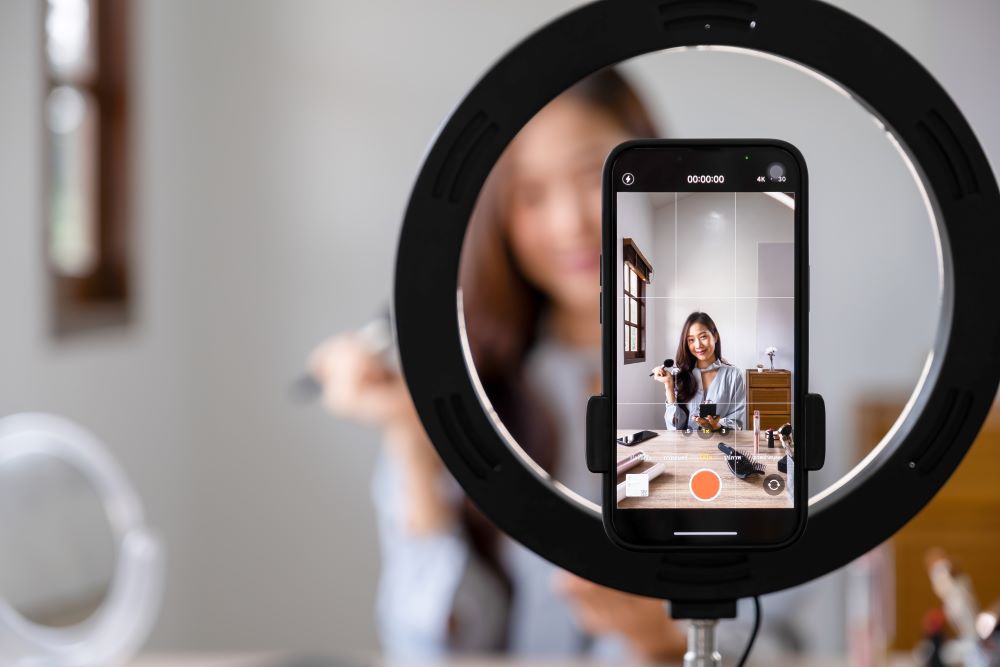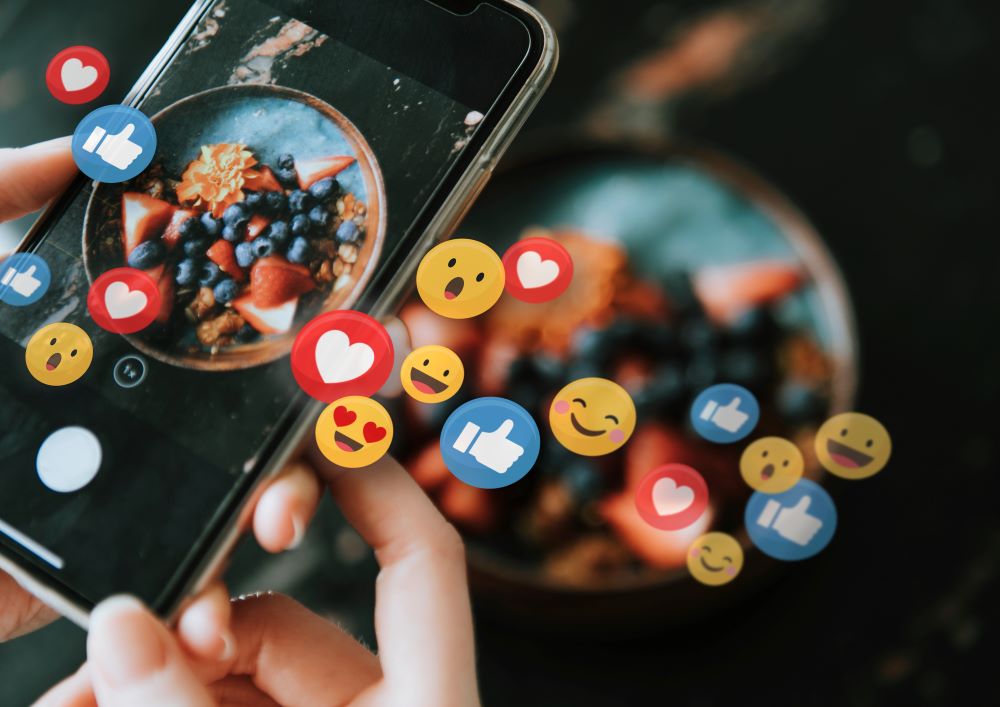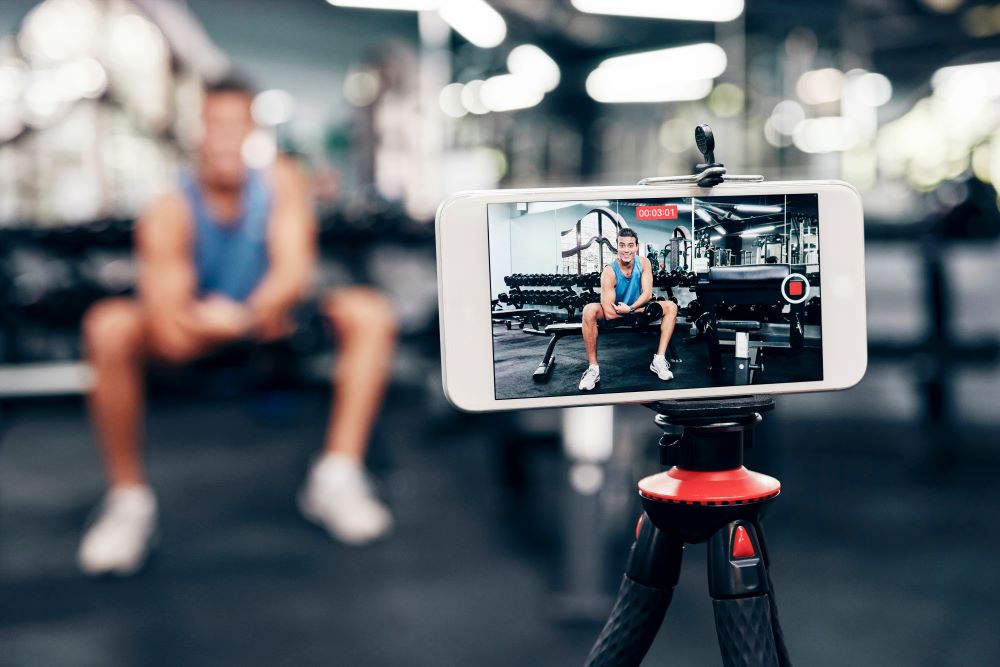The Lion's Den
What is a Key Opinion Leader (KOL)?
What is a KOL (Key Opinion Leader)

When we talk about amplifying your brand’s voice in today’s crowded marketplace, two terms frequently come to the forefront: Influencers and Key Opinion Leaders (KOLs). Though both wield considerable power in shaping consumer opinions and behaviors, their roles, reach, and methods of influence differ significantly. Influencers often leverage their social media savvy to engage audiences with compelling content, while KOLs draw upon deep expertise and credibility in specific fields to guide and inform. Understanding these distinctions is crucial for brands looking to navigate the complex landscape of digital marketing effectively.
In digital marketing, understanding the distinct roles and impacts of influencers and Key Opinion Leaders (KOLs) has become pivotal for brands aiming to connect with their audiences in meaningful ways. Let’s delve deeper into what makes KOLs unique and why they might be the best option for certain marketing objectives.
What Is a KOL: Key Opinion Leaders?
A Key Opinion Leader (KOL) is more than just a figure of authority in their respective domain; they are the go-to sources of insight and information, respected for their knowledge and often years of experience. Historically, KOLs emerged from academic, scientific, and professional spheres, where their expertise was undisputed and sought after. However, the digital revolution has expanded the realm of KOLs to include individuals who have harnessed online platforms to share their specialized knowledge, thereby influencing peers and the wider public. This evolution reflects the growing democratization of expertise, where influence is no longer confined to academic journals or professional networks but is accessible to anyone with internet access.
So why are key opinion leaders important? As a result of this authority and respect, the key opinion leaders gain influence. They can affect what their target audience thinks, which makes key opinion leaders such valuable partners for brands crafting marketing strategies to try and promote their products and services. Key opinion leaders already have a built-in community of people who listen to what they have to say, and brands can tap into that community with their help.
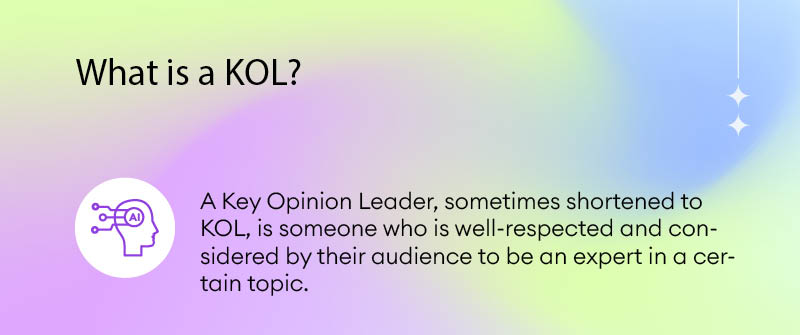
Characteristics of KOLs
Key Opinion Leaders are distinguished by several defining characteristics that elevate them above the typical influencer. Firstly, their authority is grounded in verifiable expertise, whether through academic credentials, professional achievements, or notable contributions to their field. This depth of knowledge ensures that their opinions are heard, respected, and trusted. Secondly, KOLs possess the unique ability to influence not just consumer behavior but also industry trends and practices, making them invaluable allies for brands looking to establish credibility. Lastly, the trust they command is a result of not just their expertise but also their integrity and commitment to providing value to their audience, making their endorsements all the more powerful.
What Is a KOL (Key Opinion Leader) Example?
There are examples of key opinion leaders in every industry. You don’t have to worry about no key opinion leaders in your niche; the question is just where to find them.
Digital Content Creation: Casey Neistat
In the world of YouTube and digital content production, one key opinion leader example is Casey Neistat. He became famous for his daily vlogs on the platform and has since become a strong authority in creating content for online platforms. Many people creating content online look to Neistat as an example of how to succeed in the field and value his insights on this topic. He’s one of the examples of opinion leaders in media.
Food And Nutrition: Rachel Ray
Rachel Ray is another example of famous opinion leaders in a completely different industry. Ray is a notable figure who rose to prominence with highly successful cookbooks and a television series in the food and nutrition space. She has built up a large audience of dedicated fans, and people who want to know more about food and cooking trust her advice in that realm.
Business And Entrepreneurship: Lori Greiner
As her nickname, the “Queen of QVC,” shows, Lori Grenier is a powerhouse in the business and entrepreneurship world. She holds more than 100 patents and frequently appears as one of the sharks on the long-running ABC show “Shark Tank.” People wanting to learn more about running a business or inventing consumer products can rely on Greiner’s expertise for unique insights and ideas.
These are just a few of the many, many examples of key opinion leaders currently operating in different fields. You may notice that while key opinion leaders often have some online presence, they don’t have to gain prominence through online work. Only one of these three examples can be considered a traditional social media influencer, so don’t assume that all key opinion leaders are influencers or vice versa.
What Does A Key Opinion Leader Do?
The wide variety of key opinion leaders can prompt questions about what exactly these opinion leaders do. In short, key opinion leaders establish themselves as credible, authentic experts in a particular topic or industry. They may or may not build their audiences as social media influencers, but most will eventually establish an online presence to better tap into the audience they’ve developed.
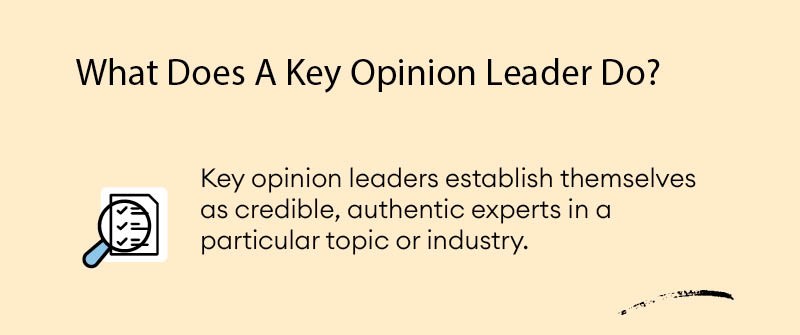
Pursue Formal Education In Their Field
Different key opinion leaders will follow different paths to establish authority and credibility on a certain topic. In more technical fields like medicine, science, and law, key opinion leaders will generally pursue advanced degrees and further education to learn more about their field of study. These degrees and educational accomplishments will back up the expertise of the key opinion leader.
Learn Through Experience
However, key opinion leaders don’t necessarily need advanced degrees or formal education. Many of the most prominent key opinion leaders are self-taught in a popular field like beauty. They gain authority through hands-on experience over months or years working directly with the products they discuss. Through experience and self-taught lessons, anyone can learn to become a key opinion leader. They just have to become someone that audience members can rely on for valuable information about their selected topic of interest.
Connect With An Audience
Even with considerable knowledge and expertise in a field, an individual isn’t considered a key opinion leader until they’ve connected with an audience. Key opinion leaders must have a community of people who consider them reliable experts on a given topic. If no one knows that a person is a trustworthy, accomplished expert in their field, that person is not a key opinion expert.
Any brands hoping to work with key opinion leaders need to be careful that they only select people who have already built up an engaged audience. Experts without established audiences are still impressive in their own right, but as brand partners, they are not going to have the same impact as true key opinion leaders.
What Is The Power Of A Key Opinion Leader?
A key opinion leader holds a lot of power that they themselves and brands can leverage to accomplish various goals. Their power comes from the attention, trust, and interest placed on them by their audience members. If a key opinion leader loses the respect or trust of their audience, they will rapidly lose any power their position held previously, so it’s important not to misuse this power or take advantage of the trust placed in them.
For brands, the important power that key opinion leaders have is the ability to influence what audiences think. As the name suggests, key opinion leaders are people that communities look to for ideas when forming their opinions. A carefully placed statement by a key opinion leader can sway their audience members one way or another on a topic.
This power to influence audiences is incredibly valuable to brands from a marketing perspective. Brands can work with key opinion leaders to help shift what people think in a way that benefits the brands. For example, a protein powder brand might partner with a respected trainer who is a key opinion leader in the fitness space. The key opinion leader would then either promote the product directly or, more broadly, educate their audience on the usefulness of protein powder, which, in turn, would benefit the brand. The relationship between brands and key opinion leaders can benefit both parties and the opinion leaders’ audiences when done right.
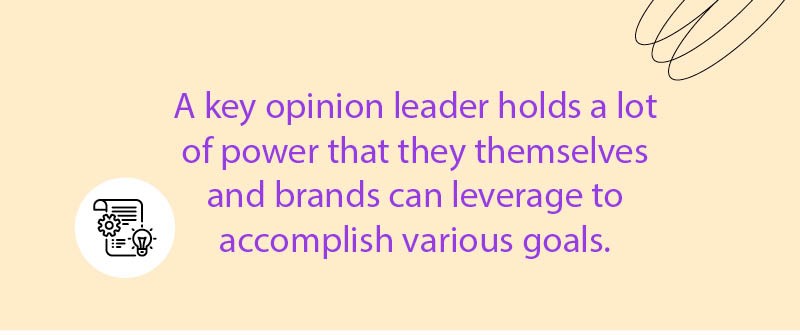
Who Is Considered A Key Opinion Leader?
There are no definitive rules for determining who is and isn’t a key opinion leader. If you’re wondering whether a specific person can be considered a key opinion leader, try asking the following questions:
- Does this person have a considerable group of people who pay attention to their work?
- Does this person have established expertise or insight into a specific field or topic?
- Does this person’s audience respect and trust their thoughts related to their chosen field or topic?
If the answer to all three of these questions is yes, the person is probably a key opinion leader. Trust, respect, and expertise are all crucial components that contribute to someone being a key opinion leader. Don’t forget that the person needs to build an audience that follows their work, too, or they may simply be an expert, not a key opinion leader.
What Is The Difference Between A Key Opinion Leader And An Influencer?
A common question about key opinion leaders is the difference between opinion leaders and influencers. In many ways, key opinion leaders and influencers have a lot of overlap. Some influencers are even key opinion leaders, though not all are.
Key Opinion Leader Vs. Influencer
The biggest difference you can use to determine whether someone is just an influencer is whether they developed their audience on a social media platform. If someone builds their audience by posting content on or more social media platforms, that person is an influencer. Key opinion leaders often build their audiences and establish their expertise through offline work, such as being writers, entrepreneurs, or politicians. Sometimes, they later develop an online presence, but that is not necessary to be a key opinion leader.
Key Opinion Leader Vs. Influencer Examples
Let’s go through some examples to highlight the differences between KOL vs. influencer.
KOL: Bill Nye the Science Guy
In the field of science education and advocacy, Bill Nye is an established key opinion leader. He rose to popularity through his television program, “Bill Nye the Science Guy,” in the 1990s and has continued to grow his audience since then. Now, Nye uses his platform to raise public awareness around science-related topics like climate change, helping the public to better understand these issues. He is not an influencer, but he is a key opinion leader in science education.
Influencer: Charlie D’Amelio
Charlie D’Amelio is a popular social media influencer who gained a huge following by posting dance videos on TikTok. She is now one of the most followed creators on the platform, posts content on other platforms like Facebook and Instagram, and stars in her own reality television show. Despite this prominence and definite status as a top-tier influencer, D’Amelio likely wouldn’t be considered a key opinion leader. She is not seen as an authority or expert in any specific field and is more general in the topics she covers in her content.
Influencer and KOL: Rosanna Pansino
Someone who is an example of being both an influencer and a key opinion leader is Rosanna Pansino. Pansino got her start on YouTube by posting baking videos and has since become a respected authority in the cooking and baking space. She has her own baking show, has published a New York Times bestselling cookbook, and is a source of baking tips and tricks that her audience relies on.
Assessing the Right Fit: KOL or Influencer?
Choosing between a Key Opinion Leader (KOL) and an influencer for your brand’s marketing strategy requires careful consideration. Here are key factors to evaluate when determining the best fit for your brand:
1. Audience Alignment
Examine the demographics and interests of the KOL or influencer’s audience. Ensure that their followers align with your target market. A KOL may have a smaller but highly engaged audience with expertise in a niche area, while an influencer might boast a larger following with broader appeal. Identify who you want to reach and assess if the potential partner’s audience mirrors that group.
2. Expertise and Credibility
Evaluate the KOL or influencer’s credentials and reputation in their respective field. KOLs are often established experts with a track record of influence in specific industries, lending them credibility that can significantly benefit your brand. On the other hand, influencers might connect more personally with their audience through lifestyle content. Consider whether your brand needs expert validation or a more relatable, personal touch.
3. Engagement vs. Reach
Consider the quality of engagement versus sheer reach. KOLs may inspire more meaningful conversations and trust among their audience due to their authority, while influencers might excel in generating buzz and reaching larger audiences quickly. Depending on your campaign goals—whether to build trust and credibility or increase brand awareness—you may prioritize one over the other.
4. Content Style and Authenticity
Look at the content style of the KOL or influencer. Does their voice and aesthetic resonate with your brand’s identity? Authenticity is crucial; a mismatch can lead to disingenuous partnerships that may backfire. KOLs tend to offer more informative and educational content, while influencers may focus on entertainment and lifestyle. Choose a partner whose content aligns with your brand values and message.
5. Previous Partnerships and Performance
Research the KOL or influencer’s previous collaborations. How have those partnerships performed? Look for case studies or testimonials that highlight the impact they’ve made for other brands. An effective KOL or influencer will have a history of successful campaigns, demonstrating their ability to drive results and achieve specific marketing objectives.
6. Long-Term Potential
Consider the potential for an ongoing relationship. KOLs and influencers who align with your brand’s vision can evolve into long-term ambassadors, fostering deeper connections with their audience over time. This can lead to sustained brand loyalty and advocacy, making it beneficial to establish a partnership that extends beyond a single campaign.
By assessing these factors, brands can make informed decisions when selecting the right KOL or influencer for their marketing strategies, ensuring they align with their objectives and resonate with their target audience.
What Are KOLs in Social Media?
Many key opinion leaders choose to post on social media, whether they got their start on these platforms or not. Social media platforms help key opinion leaders connect with their audiences and share their thoughts.
If key opinion leaders are interested in working with brands, social media provides a convenient and effective way of doing so. You may key opinion leaders promoting different brands or educating their audience on brand-related topics as part of brand partnerships they’re participating in. KOLs are all over social media but don’t get them mixed up with standard influencers.
Some other examples of KOL influencers include:
- Huda Kattan (Beauty)
- Chiara Ferragni (Fashion)
- Chris Burkard (Travel)
- Lauren Conrad (Lifestyle)
- Kayla Itsines (Fitness)
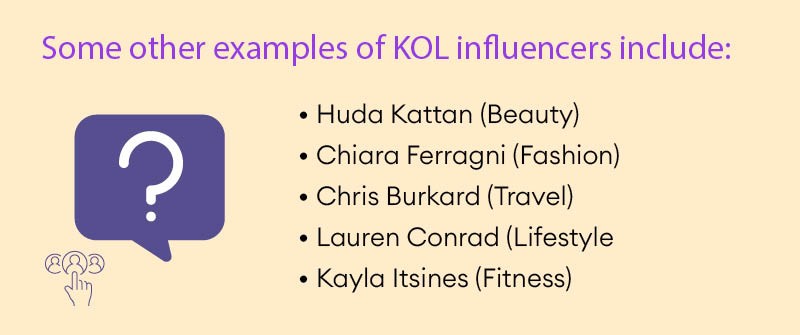
What Is a KOL in Tiktok?
One of the social media platforms where you can find plenty of key opinion leaders is TikTok. This growing social media platform emphasizes short-form video content, which can be a great way for key opinion leaders to convey their thoughts and ideas to their audiences.
It’s worth noting, however, that the average age of people posting and viewing content on TikTok is lower than on many other social media platforms. TikTok is especially popular with people under 30, and many older, more established KOLs may not post videos on the platform. Still, TikTok has plenty of key opinion leaders posting content to the platform.
What Is The Difference Between A Thought Leader And A KOL?
Two more categories people often confuse are thought leaders and key opinion leaders. In reality, thought leader is just another term for a key opinion leader. You can use both interchangeably. Once again, not all thought leaders are influencers, though. Some influencers may be thought leaders, depending on the way their audience views them and whether they have expertise in a given field. Don’t assume that just because an influencer has a larger following, however, that the influencer is also a thought leader.
What Is A KOL In Marketing?
Key opinion leaders can be invaluable partners for brands when it comes to marketing their products. Working with KOLs can help brands change the way the public views them. With the help of KOLs, brands can establish greater trust and authority, which, in turn, will grow the brand over time.
Generally, brands don’t partner with key opinion leaders simply to promote their newest product offering and move on. Key opinion leaders often become the face of a whole campaign for brands. People then begin to associate the brand with the KOL, lending the brand some of the KOL’s credibility and respect from their audience.
What Is a KOL Program?
A KOL program is when a brand partners with a key opinion leader to promote their business. To get the most out of these programs, you need to partner with the right KOL for your brand. Depending on your niche, there are probably lots of different KOLs you can choose from.
Choose someone who forms a genuine connection with your brand and who represents your brand values and goals well. The wrong KOL partner will cause your KOL program to be less effective than it should be.
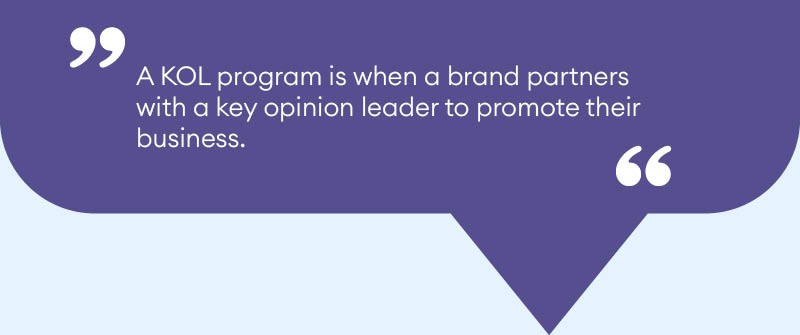
What Is the Role of a KOL Engagement?
When you create a KOL engagement, the goal is to further your brand by borrowing the trust, respect, and credibility of your key opinion leader partner. KOL engagements are branding actions that aren’t meant to promote one single product or service your brand offers. Instead, use a KOL engagement to help the public better understand and respect your brand. They’ll be more inclined to purchase your brand offerings once you’ve accomplished that.
Find the Right Respected Key Opinion Leader for Your Influencer Marketing Efforts and Brand with Lionize
Finding influencers and key opinion leaders to partner with can be challenging. Many brands want to find the right brand partners but don’t know where to start. That’s where Lionize comes in.
Lionize is an influencer marketing platform that helps brands connect with the best partners for their marketing goals. Instead of searching and trying to hunt down influencers or key opinion leader partners, Lionize finds them for you. You simply input your goals and desired qualities in your brand partners into the platform, and Lionize will return a list of suitable partners who want to work with your brand on your next marketing campaign.
Get started today to connect with key opinion leaders who can help promote your brand and create a marketing strategy with an impact you can measure.



